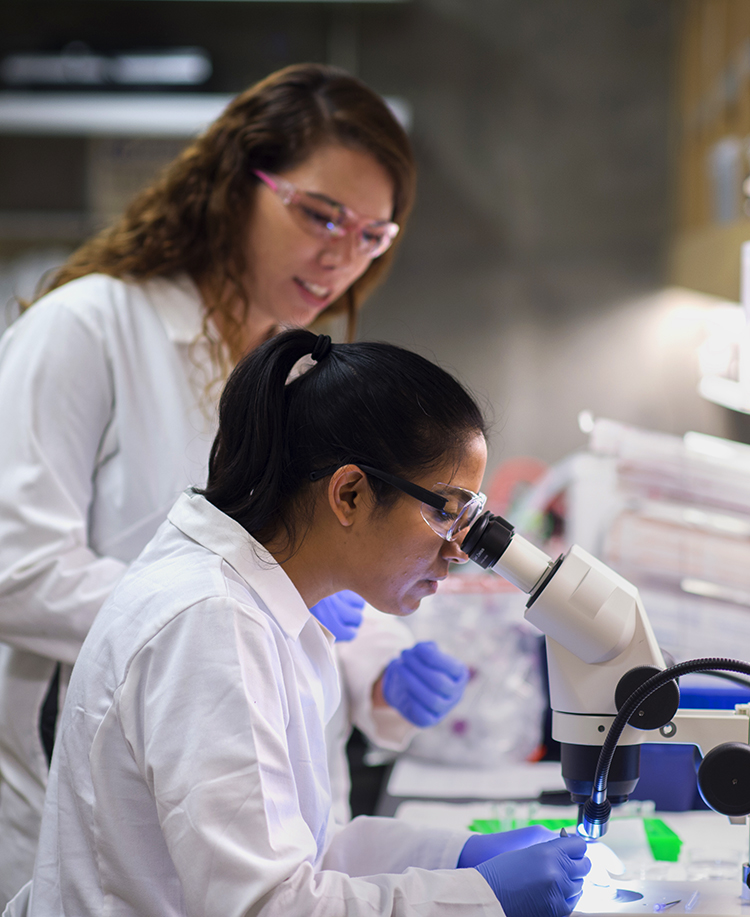“I look at UCI as being a community. If you can, you need to give back to your community,” says professor emeritus Hung Fan, right, with husband Michael Feldman. Photo: Steve Zylius, UCI
“I look at UCI as being a community. If you can, you need to give back to your community,” says professor emeritus Hung Fan, right, with husband Michael Feldman. Photo: Steve Zylius, UCI
Professor emeritus Hung Fan doesn’t need to do anything to cement his legacy. In his 34-year career, he helped establish UCI as a world-class cancer center and advanced research into how viruses cause cancer. But he’s not done.
Fan and his husband Michael Feldman have made a bequest worth an estimated $1.5 million to be split equally between the Department of Molecular Biology and Biochemistry, his home department, and UCI’s Cancer Research Institute, which he founded and directed for three decades.
“I look at UCI as being a community,” Fan says. “If you can, you need to give back to your community.”
As endowments, the gift’s principal will be invested and never spent, while the interest will be used each year to fund research projects and programs – largely at the discretion of the department chair and center director.
“We often struggle to find funding for graduate students or bridge funds for faculty who are between grants, so endowments like this can make a truly significant difference in the success of the institute or department,” says David Fruman, professor of molecular biology and biochemistry and current director of the CRI.
Much of UCI’s success as a world-renowned cancer research center can be traced back to Fan’s efforts. After coming to UCI in 1981 as a virologist, he saw the need to bring together researchers from a variety of disciplines to unlock cancer’s mysteries, and he played an early role in shaping the CRI. Fan was later instrumental in the development of Sprague Hall, built to house research labs, offices and meeting spaces for cancer researchers on campus.
In 1989, Fan co-founded the UCI cancer center, which treats patients and conducts clinical trials, as well as basic scientific research through the CRI. His vision helped put the center on the map. Now known as the Chao Family Comprehensive Cancer Center, it’s one of just 52 National Cancer Institute-designated comprehensive cancer centers in the U.S.

Fan also helped secure major funding from Robert and Peggy Sprague for the building that bears their name, and he played a role in cultivating the Chao family’s gifts to the cancer center. Now, as a retiree planning for his future, Fan finds himself in the position to make a significant gift of his own.
“My husband Michael and I both are of the view that any wealth that gets accumulated, it’s really best to provide those assets to institutions and causes we are both committed to,” he says.
But this is not Fan’s first donation. He donated $50,000 towards the construction of Sprague Hall. And he’s often made more modest gifts – including a challenge grant, where he pledged to match donations from his faculty colleagues up to $5,000.
“We at the university should be giving back to the university when we can, even if it’s at the beginning stages of our careers,” says Fan. “Modest gifts are equally important, both symbolically and because 100 small gifts can add up to a significant gift.”
“We at the university should be giving back … even if it’s at the beginning stages of our careers. Modest gifts are equally important, both symbolically and because 100 small gifts can add up to a significant gift.”
- Hung Fan
According to his colleagues, Fan is generous in many ways, including with his time, serving as a thoughtful mentor and adviser, steeped in institutional knowledge.
“He’s one of everybody’s favorite people,” says Fruman. “Not only is he a brilliant scientist, he’s a bottomless well of supportive instincts, and he doesn’t give up on struggling faculty or students. He believes anybody can succeed with proper support.”
Fan’s supportive instincts will undoubtedly be felt by future generations of UCI scientists and students, as well.